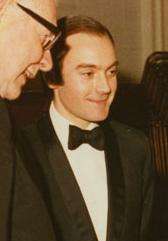Peter Palumbo, Baron Palumbo
| Peter Palumbo, Baron Palumbo | |
|---|---|
 Peter Palumbo, 1974 | |
| Born |
Peter Garth Palumbo 20 July 1935 |
| Education |
Scaitcliffe Eton College |
| Alma mater | Worcester College, Oxford |
| Occupation | property developer |
| Known for | former chairman of the Arts Council of Great Britain |
| Spouse(s) |
Denia Wigram (m.1959, div.1977) Hayat Morowa |
| Children | 6, including James Palumbo, Baron Palumbo of Southwark |
| Parent(s) |
Rudolph Palumbo Elsie Gregory |
| Relatives |
Lionel Wigram (former father-in-law) Kamel Morowa (father-in-law) |
Peter Garth Palumbo, Baron Palumbo (born 20 July 1935) is a property developer, art collector, former chairman of the Arts Council of Great Britain, architecture connoisseur and Conservative life peer.
Early life
Lord Palumbo is the son of Rudolph Palumbo, himself a major property developer,[1] and his first wife Elsie Gregory.[2] He was educated at Scaitcliffe in Englefield Green, Surrey then Eton College and studied law and jurisprudence at Worcester College, Oxford, where he graduated with a third class degree.[3]
Career
Notable property projects and homes
In the 1960s Palumbo commissioned Ludwig Mies van der Rohe to build a tower in London; although it was designed, it was never built.[4]
In 1972 Palumbo bought Farnsworth House in the US, designed by Mies van der Rohe, to which Palumbo added the designer's furniture. He also expanded the grounds of the house by purchasing adjacent properties and placed in them the work of sculptors including Anthony Caro and Richard Serra. Palumbo sold the property at auction to the National Trust for Historic Preservation in 2003. Palumbo also owns Kentuck Knob, a private house built by Frank Lloyd Wright in the Allegheny Mountains south of Pittsburgh, Pennsylvania; owned a unit in the 860–880 Lake Shore Drive Apartments in Chicago;[4] and for a time owned Le Corbusier's Maisons Jaoul in Neuilly-sur-Seine, Paris.[3]
In 1994 Palumbo demolished the Mappin & Webb building in the City of London and replaced it at No 1 Poultry, with a building designed by the British architect, Sir James Stirling, which was opened by the Governor of the Bank of England, Eddie George.
Arts
Palumbo was a trustee of the Tate Gallery from 1978 until 1985 and chairman of the gallery's foundation between 1986 and 1987. He formerly served as a trustee for the Whitechapel Art Gallery and of the Natural History Museum. He was chairman of the Serpentine Gallery's board of trustees. Margaret Thatcher appointed him chairman of the Arts Council of Great Britain from 1988 until 1994. He was also the chancellor of the University of Portsmouth[5] and the chairman of the Friends of Highgate Cemetery. He has been on the Board of Trustees of The Architecture Foundation. Palumbo is currently chairman of the jury of the Pritzker Prize for Architecture.
Palumbo led the fundraising effort to resurrect and refurbish the Church of St Stephen Walbrook in London, a building by Sir Christopher Wren which had been badly damaged during The Blitz (in World War II) — the sculptor Henry Moore was commissioned by Palumbo to build a stone altar for the church. The former rector of St Stephen Walbrook and founder of The Samaritans, Dr Chad Varah, was also the family chaplain.[3]
He was created a life peer by Margaret Thatcher on 4 February 1991 as Baron Palumbo, of Walbrook in the City of London,[6] after the ward and street named after a former river and which is in the name of his redesigned church.[3]
Personal life
He married Denia Wigram (the daughter of Lionel Wigram[7]) in 1959 — together they had one son (James Palumbo), and two daughters. They divorced in 1977. After Denia died in 1986, he married Hayat Morowa (daughter of the Lebanese newspaper publisher Kamel Morowa, and ex-wife of businessman Ely Calil[8]) with whom he had another son and two daughters.[3]
Royal connections
Palumbo was a polo teammate of Prince Charles and the two were close until 1984 when the Prince publicly criticised Palumbo's plans by Mies van der Rohe near St Paul's Cathedral that Charles described as "a glass stump"[3] which faced with opposition were not realised. In 1988, Palumbo became godfather to Princess Beatrice of York, the eldest daughter of the Duke of York.[9]
Arms
|
References
- ↑ Hugh Massingberd, ed. (1998). The Daily Telegraph Fourth Book of Obituaries: Rogues. London: Macmillan. pp. 6–9. ISBN 033373999X.
- ↑ Birth Certificate ref: June–September 1935 Marylebone 1a 602
- 1 2 3 4 5 6 "Profile: Builder of dreams or monuments?: Peter Palumbo, a visionary at the Arts Council - Voices - The Independent". The Independent. 4 December 1993. Retrieved 6 May 2014.
- 1 2 Carol Vogel (October 4, 2003), Celebrated Mies House Up for Auction New York Times.
- ↑ "History Alumni and Development University of Portsmouth". University of Portsmouth. Retrieved 6 May 2014.
- ↑ The London Gazette: no. 52443. p. 1993. 7 February 1991.
- ↑ Burke's Peerage 107th Edition, Page 3191
- ↑ Rankine, Kate (13 Sep 2003). "Business profile: Chairman with a passion for needlework". The Daily Telegraph. Retrieved 6 May 2014.
- ↑ "Princess Beatrice Gets 5 Godparents - Philly.com". Philadelphia Media Network. 2 September 1988. Retrieved 6 May 2014.
External links
| Media offices | ||
|---|---|---|
| Preceded by The Lord Rees-Mogg |
Chair of the Arts Council of Great Britain 1989–1994 |
Succeeded by The Earl of Gowrie |